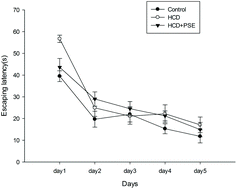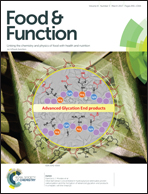Neuroprotective effects of phytosterol esters against high cholesterol-induced cognitive deficits in aged rat
Abstract
Accumulating epidemiological and experimental studies have confirmed that a high-cholesterol diet is detrimental to cognitive performance in animal models. Phytosterols, a class of naturally occurring structural components in plant foods, have been demonstrated to possess cholesterol-lowering and antioxidant effects. Phytosterol esters (PSE) are esters of phytosterol. The aim of this study was to evaluate the neuroprotective effects of PSE on cognitive deficit induced by a cholesterol-enriched diet in aged rats, and to explore their underlying mechanisms for these effects. Based on their Morris water maze performance, the latencies differed by <1.5 standard deviations (SDs) on days 3–5 of testing, 60 rats were chosen from 12-month-old female Sprague Dawley aged rats and were randomized into three groups, which were fed either a control diet, a high cholesterol diet (HCD) or a high-cholesterol diet supplemented with 2% PSE (HCD + PSE) for 6 months. In our study, we found that PSE treatment maintained the body weight balance, reduced the serum lipid levels, and improved the cognitive performance of aged rats in the Morris water maze test, as evaluated by shortened escape latencies. Importantly, histological and immunohistochemical results in the brain showed that PSE supplementation may have a neuroprotective effect that alleviates neuroinflammation in aged rats. This neuroprotective effect significantly inhibited degeneration, resulting in a significant increase in the number of pyramidal cells and an apparent decrease in the number of astrocytes compared to rats that were fed only a HCD. Furthermore, PSE improved cholinergic activities by restoring the acetylcholine (ACh) content and decreasing acetylcholinesterase (AChE) activity in the cerebral cortex, as well as by elevating choline acetyl transferase (ChAT) activity in the hippocampus and the cerebral cortex. These results suggest that PSE can play a useful role in alleviating cognitive deficit induced by a cholesterol-enriched diet and ageing.



 Please wait while we load your content...
Please wait while we load your content...